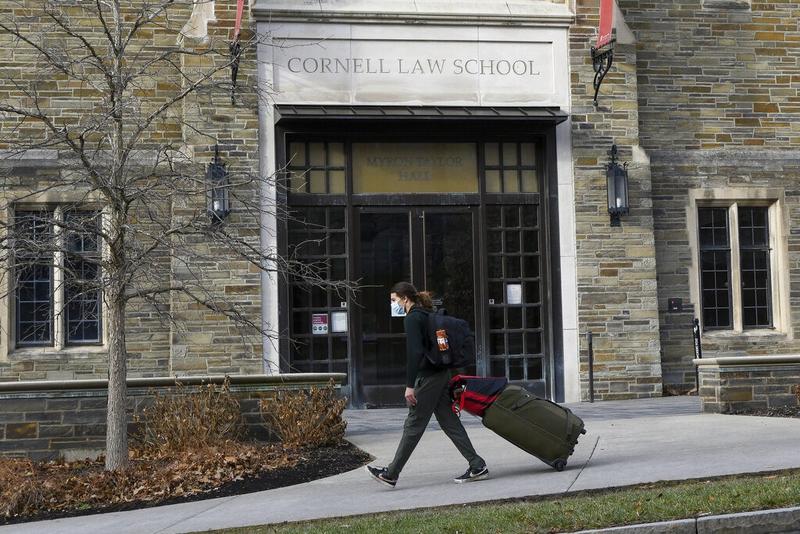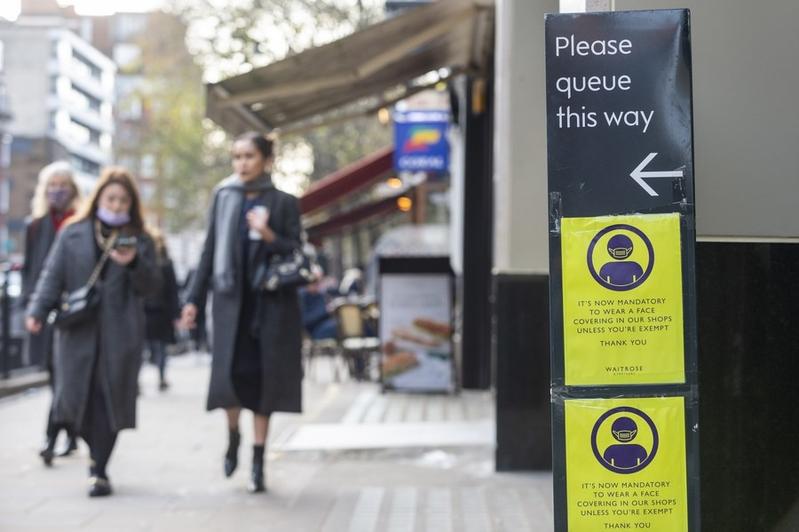 A man wheels his luggage through Cornell University's campus in Ithaca, New York, Dec 16, 2021, en route to go home after the university abruptly shut down all campus activities.
(HEATHER AINSWORTH/AP)
A man wheels his luggage through Cornell University's campus in Ithaca, New York, Dec 16, 2021, en route to go home after the university abruptly shut down all campus activities.
(HEATHER AINSWORTH/AP)
MADRID / RIO DE JANEIRO / CAIRO / PARIS / DUBLIN / LONDON / WASHINGTON - The risk of reinfection with the Omicron coronavirus variant is more than five times higher and it has shown no sign of being milder than Delta, a study showed, as cases soar across Europe and threaten year-end festivities.
The results of the study by Imperial College London were based on UK Health Security Agency and National Health Service data on people who tested positive for COVID-19 in a PCR test in England between Nov 29 and Dec 11.
"We find no evidence (for both risk of hospitalization attendance and symptom status) of Omicron having different severity from Delta," the study said, although it added that data on hospitalizations remains very limited.
"Controlling for vaccine status, age, sex, ethnicity, asymptomatic status, region and specimen date, Omicron was associated with a 5.4-fold higher risk of reinfection compared with Delta," the study showed
"Controlling for vaccine status, age, sex, ethnicity, asymptomatic status, region and specimen date, Omicron was associated with a 5.4-fold higher risk of reinfection compared with Delta," the study, which was dated Dec 16, added.
The protection afforded by past infection against reinfection with Omicron may be as low as 19 percent, Imperial College said in a statement, noting that the study had not yet been peer reviewed.
The researchers found a significantly increased risk of developing a symptomatic Omicron case compared to Delta for those who were two or more weeks past their second vaccine dose, and two or more weeks past their booster dose.
ALSO READ: First person dies from Omicron variant in United Kingdom
The study involved AstraZeneca and Pfizer vaccines.
Depending on the estimates used for vaccine effectiveness against symptomatic infection from the Delta variant, this translates into vaccine effectiveness of between 0 percent and 20 percent after two doses, and between 55 percent and 80 percent after a booster dose.
"This study provides further evidence of the very substantial extent to which Omicron can evade prior immunity given by both infection or vaccination," study lead Professor Neil Ferguson said in ICL's statement.
"This level of immune evasion means that Omicron poses a major, imminent threat to public health."
But Dr Clive Dix, former Chair of the UK Vaccine Taskforce, said it was important not to overinterpret the data.
"The conclusions made are based on making assumptions about Omicron where we still don't have sufficient data," Dr Dix said. "For example, we have no data on the cellular immune response which is now probably driving effectiveness of vaccines."
"This is a crucial missing assumption in the modelling."
Some of the conclusions are different to the data emerging from South Africa, where vaccines are holding up well against severe disease and death at present, he said.
"There is a huge amount of uncertainty in these modelled estimates and we can only be confident about the impact of boosters against Omicron when we have another month of real-world data on hospitalization ICU numbers and deaths," he said.
Brazil
Brazil on Friday reported 206 new COVID-19 deaths and 4,079 fresh coronavirus cases, in a release of incomplete national data one week after a hack of Health Ministry figures.
The 206 deaths took the total number of COVID-19 fatalities in Brazil to 617,601 since the pandemic began, the second-highest in the world after the United States.
The states of Rio de Janeiro, Paraíba, Mato Grosso do Sul, Rondônia and Tocantins did not have up-to-date data, while the state of Bahia only published deaths, according to the Health Ministry, which is still struggling after last week's hack.
Egypt
Egypt reported its first three cases of the new coronavirus variant Omicron, the health ministry said in a statement on Friday.
"Two cases are not showing any symptoms, while the third suffers mild symptoms," the ministry said.
 Pedestrians wear masks to prevent the spread of the COVID-19 as they wait at a crosswalk, near the Eiffel Tower, in Paris, Dec 14, 2021.
(THIBAULT CAMUS/AP)
Pedestrians wear masks to prevent the spread of the COVID-19 as they wait at a crosswalk, near the Eiffel Tower, in Paris, Dec 14, 2021.
(THIBAULT CAMUS/AP)
France
France will from next month reduce the time between second and third COVID-19 vaccination injections to four months and require people to show proof of vaccination to enter some venues, Prime Minister Jean Castex said on Friday.
The gap between shots is currently five months but the French government is concerned about the spread of the Omicron coronavirus variant.
Castex said that big public parties and fireworks would be banned on New Year's Eve and recommended that people — even if vaccinated — test themselves before attending year-end parties.
READ MORE: WHO: Omicron poses 'very high' risk but data on severity limited
To increase pressure on people to get vaccinated, the government will present a bill early next year to change the French health pass into a vaccination pass. That means people will have to be vaccinated to enter restaurants or use long-distance public transport.
Under current rules, a recent negative test can serve as a health pass even without vaccination.
Ireland
The Irish government on Friday ordered bars and restaurants to close at 8 pm and reduced the capacity in all public events in a bid to curb the spread of the Omicron virus.
Irish Prime Minister Micheal Martin said the measures, which will run for six weeks from Sunday, were necessary because the Omicron variant of COVID-19 was likely to bring a level of infections "far in excess of anything that we have seen to date."
"There needs to be a very strong and immediate reduction in contacts between people in order to prevent Omicron overwhelming us," Martin said in a televised address.
Ireland's COVID-19 case numbers have eased in recent days, but the government has said it expects a surge of infections as Omicron takes over.
Omicron represented 35 percent of cases reported in Ireland on Friday, up from 14 percent on Tuesday, health officials said. Some parts of neighboring Britain have reported Omicron case numbers doubling every two days.
Pfizer
Pfizer Inc on Friday forecast that the COVID-19 pandemic would not be behind us until 2024 and said a lower-dose version of its vaccine for 2- to 4-year-olds generated a weaker immune response than expected, potentially delaying authorization.
Pfizer Chief Scientific Officer Mikael Dolsten said in a presentation to investors that the company expects some regions to continue to see pandemic levels of COVID-19 cases over the next year or two. Other countries will transition to "endemic" with low, manageable caseloads during that same time period.
By 2024, the disease should be endemic around the globe, the company projected.
Spain
Spain's coronavirus infection rate rose above 500 cases per 100,000 people on Friday, crossing over the threshold considered "very high risk" by the Health Ministry and more than doubling since the start of December.
On Friday the infection rate, or incidence, as measured over the preceding 14 days, was 511 cases per 100,000, up 38 points on Thursday's 473. There were 33,359 new infections and 41 deaths according to Health Ministry data.
Roughly 80 percent of Spain's population of 47 million has been fully vaccinated against COVID-19, and some 10 million have received booster shots.
Spain has recorded 5.46 million cases and 88,708 deaths since the pandemic began.
 Two women walk past a sign requiring people to wear face coverings in London, Britain, on Dec 9, 2021. (STEPHEN CHUNG/XINHUA)
Two women walk past a sign requiring people to wear face coverings in London, Britain, on Dec 9, 2021. (STEPHEN CHUNG/XINHUA)
United Kingdom
Britain reported 93,045 coronavirus cases in the latest 24-hour period, breaking the daily record for the third consecutive day and bringing the total number of coronavirus cases in the country to 11,190,354, according to official figures released Friday.
Another 3,201 Omicron cases have been found in Britain, the biggest daily increase since the COVID-19 variant was detected in the country, taking the total Omicron cases found in the country to 14,909, said the UK Health Security Agency.
The country also reported a further 111 coronavirus-related deaths, taking the national death toll to 147,048.
Prime Minister Boris Johnson told Sky News Friday that Omicron is a "very serious threat" and that the country is seeing a "very serious wave coming through."
Meanwhile, Scotland's First Minister Nicola Sturgeon said Omicron cases have been rising exponentially in Scotland, with cases doubling every two to three days.
England's Chief Medical Officer Chris Whitty has advised people to prioritize events that matter to them in the run-up to Christmas. Whitty said the record for daily hospital admissions for COVID could be broken in the coming weeks and urged people not to "mix with people you don't have to."
United States
A US federal appeals court on Friday ruled to reinstate the vaccine mandate of President Joe Biden's administration for large private sector employers.
The ruling by the US Court of Appeals for the 6th Circuit in Cincinnati, Ohio, lifted a November injunction that had temporarily suspended the rule from the Labor Department's Occupational Safety and Health Administration (OSHA), which requires companies with 100 or more employees to vaccinate their workforce or make them subject to weekly testing and compulsory masking.
The decision was made after a 2-1 vote on the court's three-judge panel, with an opinion written by Judge Jane Stranch saying that OSHA is authorized by Congress "to assure safe and healthful working conditions for the nation's work force and to preserve the nation's human resources."
"The record establishes that COVID-19 has continued to spread, mutate, kill and block the safe return of American workers to their jobs. To protect workers, OSHA can and must be able to respond to dangers as they evolve," she said.
The ruling came as the Biden administration last month stopped the implementation of the mandate, which would otherwise take effect on Jan. 4 and affect some 80 million people, to comply with a decision by the US Court of Appeals for the 5th Circuit in New Orleans, Louisiana.
The 5th Circuit's ruling argued that OSHA exceeded its authority to regulate employers' conduct, a claim shared by the dissenting judge in the 6th Circuit's ruling.
While handing the Biden administration a temporary victory, the 6th Circuit's ruling could be appealed to the Supreme Court, which is likely to have the final say over the controversial issue.


